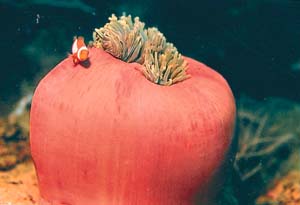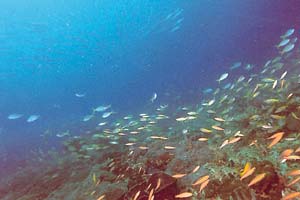|
|
Secret Underwater Gardens
Offshore Miri, Sarawak
By ANTHONY JOSEPH
 |
The underwater scenes
are startlingly haunting. |
MIRI: You've heard
of secret gardens. But secret reefs? Welcome to the secretive world of the diving elite. I
came to know of the reefs only after seeing photographs and conversing with a dive master.
It was revelatory to me, since I've been in the division for eight years and had no idea
they existed. Years ago, a dive master (Ed: he's generally unnamed in this article) came
to the realisation there was no known recreational dive sites in the State. So he set out
to find some. Putting his training as a surveyor to good use, he got hold of maps of the
Miri coast and offshore waters, including embargoed naval maps. Then the real work began.
Along with a master scuba trainer who is a former police superintendent, he began the
painstaking process of exploring the vast Miri coastal area, one square metre at a time.
Armed with only a sonar depth sounder, an underwater scooter and an underwater
communicator to keep in touch with the boatman, they spent two years sounding,
discovering, exploring and mapping 10 reef systems that appeared on no one's maps. Even
local fishermen didn't know about these new reefs. One of the first sites they found is
now eponymously named Mike's Reef (named after the dive master himself). Like most of the
sites off Miri, the reef is shallow, between a depth of 10 and 15 metres.
 |
Classic view for the
diver: clown fish and anemones. |
However, the
variety and colour of the coral formations, macro marine life - including a full palate of
nudibranchs - as well as its proximity to shore which is just 20 minutes by speed boat,
has made Mikeís Reef a popular night dive destination. At 300 metres by 200 metres,
Scubasa Reef is the largest reef mapped off Miri to date. It features both hard and soft
coral, including leather corals, elephant ear and dead man's finger formations. The reef
is home to giant anemones (complete with territorial resident clown fish) as well as
schooling yellow tail fusiliers. During August, migrating green turtles are also often
resting and feeding on Scubasa Reef. As might be inferred by the name, Tyre Reef is an
artificial reef. What might not be inferred is that this 200-metre long necklace of giant
tyres was built by the Malaysian Fisheries Department on a sandy bottom at 15 metres.
Although the flexible tyres don't provide a stable base for coral growth, the site has
attracted groupers, sweetlips and puffer fish in high concentrations, as well as the
occasional leopard shark and a profusion of smaller reef fish.
 |
The diversity of
marine life is quite stunning. |
Scubasa Drop Off is
the furthest site from shore (40 minutes by boat), but it is worth the trip. When I dived
at the site, there was surface surge and plankton clouding visible from the boat. However,
the water calmed down and cleared up below six metres to offer spectacular 20- metre-plus
visibility. The reef consists of five strips of runway-like reef measuring 400 metres
long, mainly at a depth of 20 metres and with a wall drop of 45 metres. Because Scubasa
Drop Off reefs have very few pinnacles or other outcroppings of marine life to hide
behind, you get a good, long, unobstructed view of the site's inhabitants, which include
blue spotted rays, white tip sharks, humphead wrasse, unicorn fish, turtles and batfish.
Those divers who find time to look up may even see the occasional whale shark trolling the
surface above this site.
 |
Imagine stumbling
across this just 20 minutes from the shore. |
The Atago Maru, a
110-metre Japanese merchant ship converted into a troop transport vessel, was sunk during
World War II. It rests upright in 10 metres of water off Miri. The hull is almost entirely
covered with cave coral and it has become home to a 60kg groupers, along with schools of
trevallies, barracudas and African pompanos. Sea Fan Garden, a 20-metre deep site,
features an amazing array of gorgonian sea fans and sea whips, while VHK Reef features
plate coral and abundant, colourful reef fish. Sunday Reef, a macro photographer's haven,
and distant Siwa Reef round out Miri's top ten.
The best season to
dive in Miri is March to September, when you can expect visibility of up to 30 metres.
During the rest of the year, the monsoon can cause visibility to plummet to 10 metres or
less.
 |
Darting fish comes
across as a blurry clump of darts |
Although even more sites with good diving
potential have been located, the discoverers are keeping them secret. That's because of
their vulnerability to destruction. They include Azam's Reef, named after the man who
captained the boat during early reef exploration. Then there's Batu Mayat, an unusual reef
system shaped like a man. Although local fishermen have known about this site for
generations, they avoid it for fear of enraging the submerged figure, which purportedly is
averse to crude jokes. Superstitions aside, fishermen may soon be avoiding the entire Miri
reef system. The entire network of reefs could soon be declared a marine park to prevent
overfishing and degradation of the sites.
Source: Borneo Post
Miri
& Sarawak Tour Packages
BACK
TO LEISURE PAGE |
